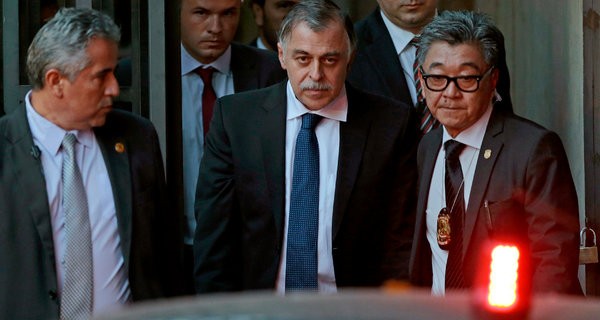Scandal Over Brazilian Oil Company Adds Turmoil to the Presidential Race

President Dilma Rousseff is in a tough fight for the Oct. 26 election after a former executive at Petrobras took a plea bargain and testified that her party had benefited from a bribery scheme.
Paulo Roberto Costa was living an oilman’s dream. He had a house in a luxurious gated community here. He bought a yacht and drove an armored Range Rover. He had more than $25 million stashed in bank accounts in Switzerland and the Cayman Islands.
But that dream evaporated recently when the police arrested Mr. Costa and charged him with orchestrating a bribery scheme on an epic scale at Petrobras, Brazil’s national oil company, and funneling the proceeds to the governing Workers Party and its allies while enriching himself.
The case has presented a major challenge to President Dilma Rousseff, who is in a bitter re-election fight against Aécio Neves, a centrist who has been gaining momentum as the vote next Sunday approaches.
With the two candidates battling each other for the lead in opinion polls, Mr. Neves is seizing on the oil scandal to excoriate Ms. Rousseff and her administration, thrusting Mr. Costa, a 60-year-old engineer, into the national spotlight.
Faced with the likelihood of a lengthy prison term, Mr. Costa, formerly one of Petrobras’s most powerful executives, accepted a plea deal from prosecutors. In return, he is testifying in detail that he turned the refining division of Petrobras, Brazil’s largest company, into a slush fund for Ms. Rousseff’s Workers Party and its coalition in Brasília.
“The accusations suggest corrosive conclusions about Brazilian democracy,” said Matthew M. Taylor, a scholar at American University in Washington who specializes in Brazil’s legal system. “If proven true, then even flagship state companies are seen as fair targets to finance politics, and legislative coalitions continue to be held together by the glue of corruption.”
At the same time, the scandal has highlighted the competing ideological visions of how Petrobras, which has made some of the largest oil discoveries in the world this century, should be managed.
Mr. Costa has testified that he started inflating budgets for new projects after he was promoted to oversee refining operations nearly a decade ago, accepting bribes equivalent to 3 percent of the value of the deals from the Brazilian construction companies that obtained the contracts.
In another twist to the oil scandal and its influence on the presidential race, Mr. Costa said he bribed a major figure in Mr. Neves’s Social Democracy Party in 2009 to shelve a previous inquiry into irregularities at Petrobras.
Investigators have corroborated Mr. Costa’s claims through an associate, Alberto Youssef, a black-market money dealer who testified that he helped launder funds in the scheme. Mr. Youssef, who has also accepted a plea deal, testified that more than a dozen of Brazil’s largest construction companies had paid hefty bribes to obtain lucrative Petrobras contracts.
“Scandals like the one at Petrobras topple presidents in countries with political consciousness,” said Ruth de Aquino, a columnist at the magazine Época. “In Japan, some politicians and executives commit suicide when they’re caught in theft of such magnitude. Here in Brazil, this doesn’t even peeve our leaders.”
Source: NYT- Scandal Over Brazilian Oil Company Adds Turmoil to the Presidential Race




























